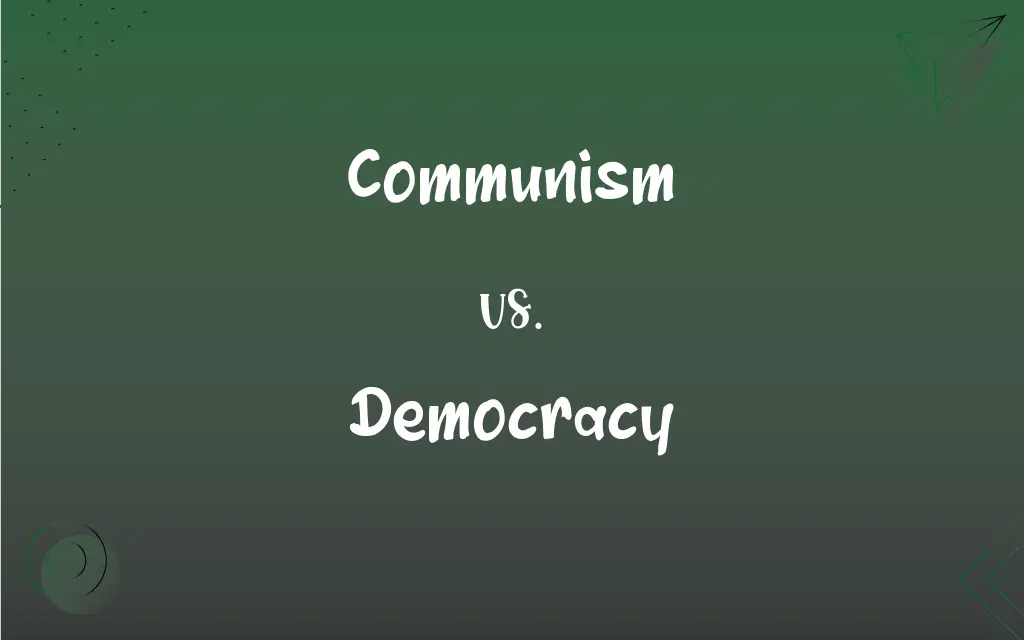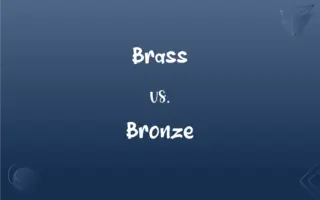Communism vs. Democracy: What's the Difference?
Edited by Janet White || By Harlon Moss || Updated on October 17, 2023
Communism is an economic and political system advocating classless societies and state ownership of means of production; democracy is a political system where power resides with the people, often through elected representatives.

Key Differences
Communism is a socio-economic system where the means of production, such as factories and farms, are owned collectively by the state or the community. Democracy, however, is a system of governance in which power is vested in the people, either directly or through elected representatives.
The tenets of communism often advocate for a classless society where wealth and resources are distributed based on need. Democracy, on the other hand, does not dictate economic structure but emphasizes individual rights and freedoms, with citizens having a say in governance.
In many historical instances, communism has been implemented in nations under a single-party rule, with limited political freedoms. Democracy, in contrast, generally promotes multi-party systems, freedom of speech, and the rule of law, ensuring the protection of individual rights.
While communism primarily addresses economic disparity by aiming to abolish private property and promote communal ownership, democracy focuses on political representation and the importance of civic participation, allowing people to have a voice in decision-making.
It's crucial to note that these concepts aren't mutually exclusive. Some countries have attempted to blend elements of communism with democratic governance, leading to various hybrid systems worldwide.
ADVERTISEMENT
Comparison Chart
Definition
An economic and political system promoting state or communal ownership.
A governance system where power is vested in the people.
Economic Focus
Aims for classless society and wealth/resource distribution based on need.
Does not specify economic structure; can coexist with various economies.
Political Structure
Often associated with single-party rule.
Generally promotes multi-party systems and political freedoms.
Key Principle
Abolition of private property.
Political representation and protection of individual rights.
Role of Citizens
Typically limited political participation.
Active role in governance, often through voting and civic participation.
ADVERTISEMENT
Communism and Democracy Definitions
Communism
An ideology aiming for a classless society.
Communism envisions a future without economic classes or wealth disparity.
Democracy
A system of governance where power is vested in the people.
In a democracy, citizens have the right to vote for their leaders.
Communism
A political and economic system opposing capitalist structures.
Communism arose as a counter to capitalist exploitation in the 19th century.
Democracy
Can be direct or representative in nature.
While ancient Athens practiced direct democracy, the U.S. uses a representative democracy.
Communism
A system advocating for the communal ownership of means of production.
In communism, industries might be owned by the state rather than private individuals.
Democracy
Emphasizes the protection of individual rights.
Freedom of speech and assembly are cornerstones of democracy.
Communism
Often associated with Marxist theory.
Marx and Engels outlined their vision of communism in 'The Communist Manifesto.'
Democracy
Generally promotes political freedoms and multi-party systems.
A healthy democracy encourages diverse political opinions and party competition.
Communism
Aims for wealth and resource distribution based on need.
In pure communism, people would receive goods and services based on their requirements.
Democracy
Ensures rule of law and accountability.
In a democracy, even leaders are held accountable to the law.
Communism
A theoretical economic system characterized by the collective ownership of property and by the organization of labor for the common advantage of all members.
Democracy
Government by the people, exercised either directly or through elected representatives.
Communism
A system of government in which the state plans and controls the economy and a single, often authoritarian party holds power, claiming to make progress toward a higher social order in which all goods are equally shared by the people.
Democracy
A political or social unit that has such a government.
FAQs
What is communism?
Communism is a political and economic ideology advocating for a classless society where the means of production are owned collectively by the community.
How is communism different from socialism?
While both advocate for collective ownership, socialism can coexist with various political systems, whereas communism specifically seeks a classless, stateless society.
Are all communist states the same?
No, various countries have implemented communism differently based on their historical and cultural contexts.
Who is the main thinker behind communism?
Karl Marx and Friedrich Engels are the main figures behind the development of communist thought, with their work "The Communist Manifesto."
Does communism oppose private property?
Yes, in its purest form, communism opposes private ownership of the means of production, advocating for collective ownership.
Why did communism collapse in Eastern Europe?
A combination of economic difficulties, desire for political freedoms, and external pressures led to its collapse in the late 20th century.
What symbols are associated with communism?
The hammer and sickle, red star, and the color red are commonly associated symbols.
How does democracy uphold individual rights?
Democracy typically emphasizes the protection of individual rights, often through constitutions and legal frameworks.
What are the criticisms of communism?
Critics argue it stifles individual initiative, can lead to authoritarianism, and has economic inefficiencies.
Is communism inherently authoritarian?
While many communist states have been authoritarian, the ideology itself does not dictate an authoritarian governance.
What is democracy?
Democracy is a system of government where citizens exercise power directly or elect representatives to make decisions on their behalf.
Why is freedom of the press important in a democracy?
It ensures transparency, holds leaders accountable, and allows citizens to make informed decisions.
Has any country achieved pure communism?
No country has achieved the classless and stateless society described by Marx.
Why is the rule of law important in a democracy?
It ensures that all citizens are treated equally and that leaders cannot abuse their power.
What are the criticisms of democracy?
Critics argue it can lead to "tyranny of the majority," be inefficient, and sometimes prioritize short-term needs.
Can a country be both democratic and communist?
In theory, yes. A country can have a democratic political system with a communist economic system.
What is participatory democracy?
A system where citizens have a direct role in decision-making processes, beyond just voting.
What are the main types of democracy?
Direct democracy (people directly decide on laws) and representative democracy (people elect officials to represent them).
What is the difference between a democracy and a republic?
All republics are democracies, but not all democracies are republics. A republic is a representative democracy with an elected head of state.
How is a direct democracy different from a representative democracy?
In a direct democracy, citizens vote on laws and policies directly. In a representative democracy, they elect officials to make those decisions.
About Author
Written by
Harlon MossHarlon is a seasoned quality moderator and accomplished content writer for Difference Wiki. An alumnus of the prestigious University of California, he earned his degree in Computer Science. Leveraging his academic background, Harlon brings a meticulous and informed perspective to his work, ensuring content accuracy and excellence.
Edited by
Janet WhiteJanet White has been an esteemed writer and blogger for Difference Wiki. Holding a Master's degree in Science and Medical Journalism from the prestigious Boston University, she has consistently demonstrated her expertise and passion for her field. When she's not immersed in her work, Janet relishes her time exercising, delving into a good book, and cherishing moments with friends and family.































































